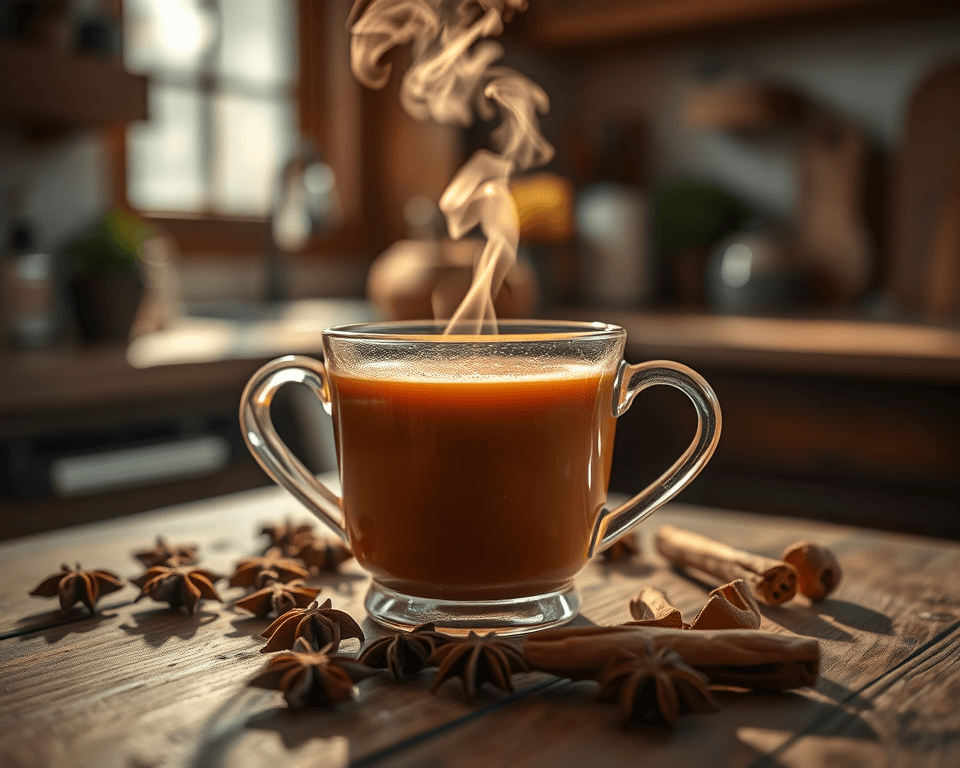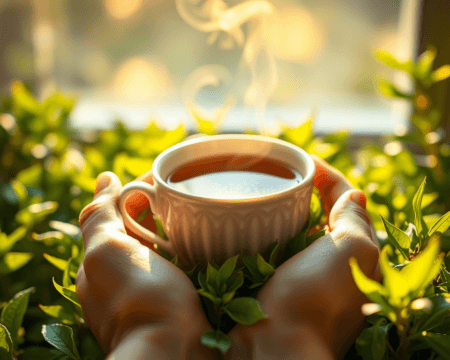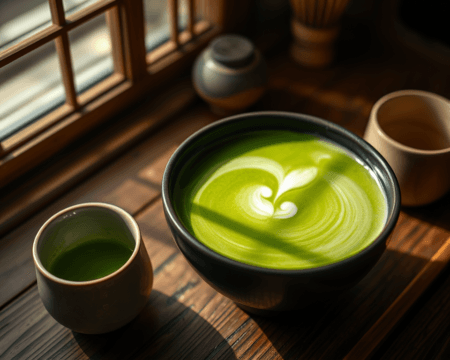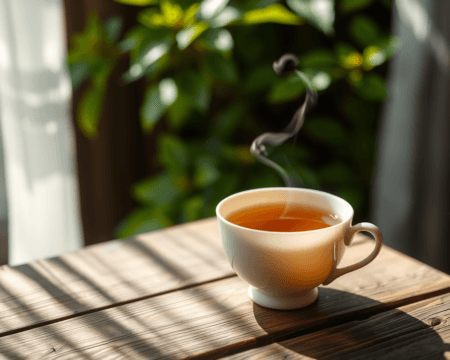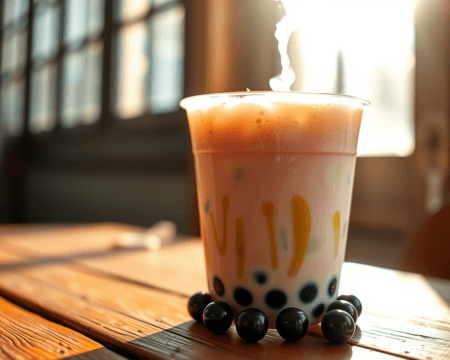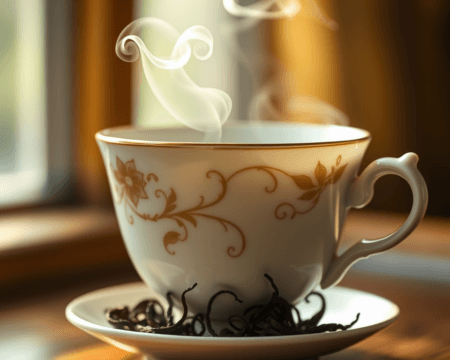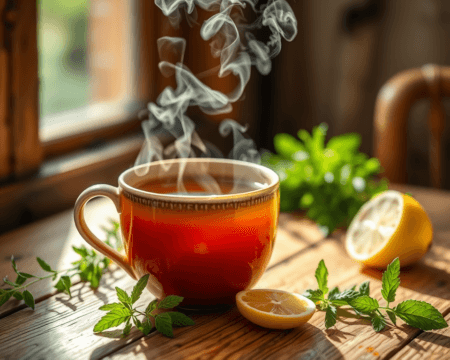There’s something magical about a warm cup of chai tea or a robust coffee in your hands. These beverages can feel like comfort, energy, or even a social connection. But let’s clear the air: Is chai tea coffee? Spoiler alert: it’s not. But hold on! This isn’t just about tea and coffee. There’s a whole world of flavors, cultures, and health benefits to unpack here. Ready to break it down? Let’s go!
Key Takeaways
- Chai tea is a spiced tea traditionally made with black tea, milk, and a mix of spices, while coffee comes from coffee beans with multiple preparation methods.
- Chai doesn’t contain coffee; they each have unique ingredients and health benefits, fueling different experiences.
- Both chai and coffee hold significant cultural importance globally, from social rituals to health trends.
- Understanding these drinks enriches your appreciation, whether you’re sipping a masala chai or a smooth espresso.
Defining Chai Tea and Coffee
What is Chai Tea?
Alright, first things first! Let’s break down what chai tea really is. Chai is simply the Hindi word for tea, but in the Western world, when people say chai, they’re often referring to masala chai. This flavorful beverage hails from India and combines:
- Black tea leaves for a solid base.
- Milk for that creamy texture.
- A blend of spices—think cardamom, ginger, cloves, and cinnamon.
The traditional preparation involves boiling the tea leaves with spices and milk. It’s a process steeped in heritage, often enjoyed with family and friends. You can feel the warmth of the spices dance through the cup, inviting you to savor the moment.
What is Coffee?
Now, let’s chat about coffee! Defined simply, coffee originates from roasted coffee beans, which are ground and brewed to create that cup of energy we’re all familiar with. There’s much more to it—coffee can be tailored in various ways. You might enjoy:
- Espresso, characterized by its rich flavor and concentrated caffeine.
- Brewed coffee, which can vary in strength based on preparation methods—from drip to French press.
- Flavor profiles that range from fruity to nutty, with some varieties showcasing chocolate notes.
The world of coffee is vast and exciting! It’s a drink that fuels mornings and late-night brainstorming sessions alike.
The Ingredients: Chai Tea vs Coffee
Ingredients in Chai Tea
When you look at a cup of chai, you see a medley of flavors coming from its common ingredients:
- Black tea is a must—look for brands like Assam or Darjeeling.
- Then comes a variety of spices. Each household may have its special blend, but you’d typically find ginger for warmth, cardamom for sweetness, cinnamon for spice, and sometimes a kick of pepper.
- Milk is usually added, making it creamy and rich. Depending on your preference, it could be whole milk, evaporated milk, or even almond milk if you’re feeling adventurous.
- Some folks add sweeteners like sugar or honey to enhance the flavor.
With chai, the variations are endless, influenced by region, personal preferences, and even seasonal availability of spices.
Ingredients in Coffee
On the flip side, let’s dig into coffee’s ingredients. What you’ll find depends on how fancy you want to get:
- Starting with coffee grounds, and trust me, the quality matters. Brands like Blue Bottle Coffee or Stumptown are top-notch.
- Coffee lovers often play with brewing methods. Go classic with a drip coffee maker or elevate your game with a pour-over or AeroPress.
- Some like to elicit creativity with additives—think flavored syrups, creamers, or spices inspired by chai (yep, I’m talking about those chai lattes).
- You might even enjoy a shot of espresso blended into your coffee for that extra punch.
One thing’s for sure: both beverages have ingredients that can be tailored to match your taste.
Does Chai Tea Contain Coffee?
Exploring the Composition of Chai Tea
Let’s clear this up straight away: chai tea does not contain coffee! What’s interesting is the cultural crossover between the two. While they feature unique tea blends and coffee grounds, they share similar caffeine levels, at least when compared in individual servings.
You’ll often find misconceptions about chai being similar to coffee simply because they’re both caffeinated beverages that comfort and energize us. But they’re distinct in so many ways! Chai brings in those rich spices—it’s a whole experience. Coffee, however, focuses more on the beans’ variety, roast level, and brewing precision. You might think, “What if I just mix them?” Let me tell you, chai lattes are a sweet fusion, but deep down, these drinks remain true to their roots.
Chai and Coffee Variations
In the world of beverage creativity, chai and coffee aren’t just separate entities; they intersect beautifully in fusion drinks. You can whip up your own chai latte with shots of espresso or even try a spiced coffee that captures elements of both worlds. How about a dirty chai? It combines the warming spices of chai with the kick of coffee! Sounds tempting, right?
Popular variations you might enjoy include:
- Chai lattes, where steamed milk meets spiced chai.
- Dirty chai, a creation that’s taking coffee shops by storm—chai with a shot of espresso, perfect for those who can’t choose just one.
- Coffee blends like spiced mocha that bring together elements of both.
With creativity, you can brew exciting drinks that resonate with your palate while savoring techniques from both realms.
Cultural Significance of Chai Tea and Coffee
Chai Tea in Cultural Context
Chai is more than just a drink—it’s a tradition. In many Indian households, making chai is an everyday ritual. It’s about gathering, sharing stories, and connecting with loved ones. Whether it’s welcoming guests or starting the day, chai transcends mere consumption; it represents hospitality and warmth.
Each region adds its flair. For example:
- In Mumbai, street vendors serve chai in tiny cups, creating an atmosphere of hustle and camaraderie.
- In Kolkata, you might find vendors blending it with local favorites like samosas or patties during tea time.
Coffee’s Cultural Role
Meanwhile, coffee has woven itself into cultures worldwide. Coffeehouses grew as social hubs, from the famed Café de Flore in Paris to local coffee shops in your neighborhood. These spots are doing more than just serving coffee; they’re creating community and dialogue.
In the US, coffee culture has exploded! From artisanal shops where latte art is practically worshipped to major chains like Starbucks that introduced the world to the Pumpkin Spice Latte, the role of coffee in daily life is significant. People connect over coffee, whether it’s for meetings, catching up with friends, or simply enjoying a moment of peace.
Health Benefits: Chai Tea vs Coffee
Health Benefits of Chai Tea
Chai tea isn’t just delicious; it’s packed with health properties. With the blend of black tea and various spices, you’re getting a treasure trove of benefits. Those spices, like ginger and cardamom, are known for their digestive health benefits and can even boost your metabolism.
Drinking chai can offer:
- Antioxidants from tea, which help combat free radicals in the body.
- Caffeine, but at levels lower than coffee, providing a gentle pick-me-up without jitters.
And let’s not forget about the soothing effects. When the weather turns chilly, a cup of spicy chai feels like a hug in a mug.
Health Benefits of Coffee
Coffee’s got its health benefits too! It’s loaded with antioxidants and has been shown in research to provide:
- A cognitive function boost, sharpening focus and improving mood.
- Potential positive impacts on heart health when consumed in moderation.
- An energy boost that can enhance workout performance.
But, like everything, moderation is key. Overdoing it can lead to anxiety and restlessness, not to mention that dreaded crash.
Popular Chai Tea and Coffee Recipes
Classic Chai Tea Recipes
If you’re feeling adventurous, here are a couple of ways to make some classic chai at home. Trust me, once you try making your own, you’ll never go for that instant stuff again!
Traditional Masala Chai
- Ingredients: 2 cups water, 2 tablespoons black tea leaves, 1 cup milk, 1 tablespoon sugar, spices (ginger, cardamom, cloves as desired).
- Instructions: Boil water, add tea leaves and spices. Let it simmer for a few minutes, then pour in milk and sweeten to taste. Strain and enjoy!
Iced Chai
- Follow the traditional recipe but let it cool. Serve over ice for a refreshing treat.
Creative Coffee Infusions
When it comes to coffee, let’s think outside the box. Try mixing things up with these fun recipes:
Chai Latte
- Brew a strong cup of chai and add a shot of espresso. Top with foamed milk for that café experience at home.
Spiced Mocha
- Blend your favorite ground coffee with cocoa powder and add a pinch of nutmeg. Brew it, and finish with steamed milk for a deliciously cozy drink.
These recipes will not only elevate your beverage game but also give you the tools to impress friends at your next gathering.
There you have it! Now, whenever someone asks if chai tea is coffee, you can confidently explain their differences while appreciating their rich traditions and flavors. Whether you’re curling up with a book and a cup of chai or gearing up for a busy day with coffee, each drink has its place in your life. Enjoy every sip!
Frequently Asked Questions
What is the main difference between chai and coffee?
Chai is a spiced tea made primarily from black tea, milk, and various spices, while coffee is brewed from coffee beans. These differences in ingredients lead to distinct flavors, aromas, and potential health benefits associated with each beverage.
Is chai healthier than coffee?
The health benefits of chai and coffee vary based on individual preferences and ingredients. Chai contains antioxidants from tea and spices, which may aid digestion, while coffee is known for its caffeine content, which can boost energy. Consider your dietary needs when choosing between the two.
Can chai be made without milk?
Yes, chai can be prepared without milk for a dairy-free option. Almond, coconut, or oat milk can be used as substitutes, or you can enjoy it as a herbal infusion with water and spices, maintaining its rich flavor profile.
How do the caffeine levels in chai and coffee compare?
Coffee typically contains more caffeine than chai. An average cup of coffee has about 95 mg of caffeine, while chai usually contains around 30-50 mg per cup, depending on the tea’s strength and the preparation method used.
What spices are commonly used in chai?
Traditional masala chai includes a blend of spices such as ginger, cardamom, cinnamon, cloves, and black pepper. The specific mixture can vary by region and personal taste, contributing to the beverage’s unique flavor.
Can chai and coffee be enjoyed during the same meal?
Yes, both chai and coffee can be enjoyed during the same meal, but timing may depend on personal preferences. Some might prefer the lighter, spicy notes of chai with certain meals, while others may favor the boldness of coffee after a meal.
Are there different types of chai?
Absolutely! There are numerous variations of chai, including masala chai (spiced), chai latte (creamier version), and Kashmiri chai (often pink and topped with nuts). Each type offers a unique taste and experience.
Is it easy to make chai at home?
Yes, making chai at home is quite simple! All you need are black tea leaves, milk (or milk alternatives), sugar, and your choice of spices. Combine them in a saucepan, simmer, and enjoy a fresh cup of homemade chai.
Can chai help with digestion?
Yes, chai can aid digestion, especially when it contains spices like ginger and fennel. These ingredients are known for their digestive properties, helping to soothe stomach discomfort and promote healthier digestion after meals.




